英语人教版八年级下册Unit-1-What_'s-the-matter
人教版初二(下)英语unit1 what's the matter知识点讲解与练习

八年级下册英语Unit 1 what’s the matter?词汇篇学生通过本讲学习,能够掌握本单元的重点词汇句型,并在综合能力上有一定的拓展。
1.matter的用法(1)名词:事情,问题What’s the matter? =what’s wrong (with you)? =what’s the trouble怎么啦?出什么事啦?(2)动词:有重大影响,有重要性如:What does it matter?2.疾病的表达法have a cold/a fever/ a toothache/ a stomachache3.take 的固定搭配take one’s temperature/ take breaks/ take risks/take some medicine/take off/ take care of/take away 4.surprise的用法1.做名词:to one’s surprise 使。
惊讶的,出乎。
意料2.做动词:surprise sb使某人吃惊3.做形容词:surprising, surprised的用法5.get的用法get off下车/get on上车/get into陷入,参与6.be used to sth/doing sth 习惯于做某事be used to do sth 被用作去做某事used to do sth 习惯于做某事7.out of的固定搭配look out of 向。
外看/ get out of从。
出来/ run out of用光基础演练1.---What’s wrong ______you?---I fell off the bike and hurt my leg.A. ofB. withC. forD. by2.Tom and Jenny enjoyed _________playing computer games.A. himselfB. herselfC. ourselvesD. themselves3. Sally became interested ___________science and wanted to be a scientist.A. forB. inC. throughD. at4. ---I had a __________.---You’d better go to see a dentist.A. headacheB. feverC. coldD. toothache5. I didn’t _________my temperature, but I knew I had a fever.A. giveB. setC. takeD. show二、根据汉语意思翻译句子。
人教版八年级英语下册 Unit 1 What’s the matter?知识点复习

人教版英语八年级下册第一单元知识点过关Unit 1 What’s the matter?一、重点短语1. have a fever 发烧,具体运用:She has a fever and she should lie down and rest.2. have a cough 咳嗽,cough既可以作名词,也可以作动词3. have a toothache 牙疼;tooth牙齿+ ache疼痛toothache 牙痛4. talk too much 说得太多;类似短语:eat too much吃太多5. drink enough water 喝足够的水;take enough money带够钱6. have a cold 受凉、感冒;也可以用catch a cold7. have a stomachache 胃疼;stomach胃+ache疼痛stomachache 胃疼8. have a sore back 背疼;sore疼痛+back背sore back背疼9. have a sore throat 喉咙痛10. lie down and rest 躺下休息11. hot tea with honey 加蜂蜜的热茶;with表示“带有”12. see a dentist 看牙医;看医生用“see”13. get an X-ray 拍X 光片14. take one’ s temperature 量体温;量体温、服药都用“take”15. put some medicine on sth. 在……上面敷药;例如:put some medicine on the cut在切口处敷药16. feel very hot 感到很热;feel感官动词,后接形容词17. sound like 听起来像;例如:sounds like a good idea 听起来像个好主意18. all weekend 整个周末;类似短语:all day \ all night \ all month19. in the same way 以同样的方式20. go to a doctor 看医生21. go along 沿着……走;类似短语:walk along22. on the side of the road 在马路边23. shout for help 大声呼救24. without thinking twice 没有多想;without是介词,后接动词ing形式25. get off 下车;反义词get on上车26. have a heart problem 患有心脏病27. to one’ s surprise 使....... 惊讶的;例如:to my surprise \ to his surprise28. thanks to 多亏了、由于;例如:Thanks to the the doctors , the patient was saved in time. 多亏了医生们,这个病人及时被救了。
人教版八年级下册英语Unit1 What’s the matter
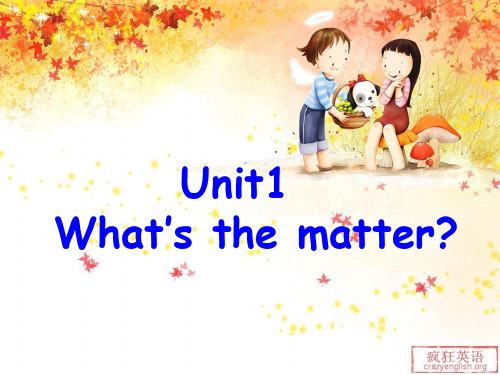
(2)主语+have/has+a+sore+发病部位
have a sore leg
have a sore foot
(3)主语+have/has+a+部位-ache
have a headache
have a toothache
(4)(There is)something wrong with +one’s+部位
lie down 躺下 rest/have a rest 休息
lie down and rest
A:What’s the matter? B: I have a stomachache. A: That’s too bad.You should lie down
and rest.And don’t eat anything for two hours. B:I guess I should.
have a toothache
牙痛
have a headache
头痛
have a sore back
背痛
have a sore throat
喉咙痛
What’s the matter with you ? =What’s the trouble with you? =What’s wrong with you?
honey n. 蜂蜜
drink hot tea with honey
A:What’s the matter? B: I have a sore throat. A: You should drink some hot tea
with honey. B:That sounds like a good idea.
人教版八年级下册英语全册 课文原文+翻译
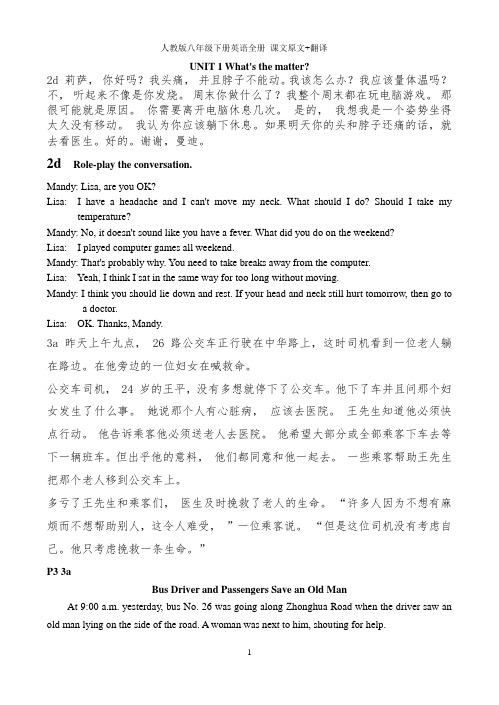
UNIT 1 What's the matter?2d 莉萨,你好吗?我头痛,并且脖子不能动。
我该怎么办?我应该量体温吗?不,听起来不像是你发烧。
周末你做什么了?我整个周末都在玩电脑游戏。
那很可能就是原因。
你需要离开电脑休息几次。
是的,我想我是一个姿势坐得太久没有移动。
我认为你应该躺下休息。
如果明天你的头和脖子还痛的话,就去看医生。
好的。
谢谢,曼迪。
2d Role-play the conversation.Mandy: Lisa, are you OK?Lisa: I have a headache and I can't move my neck. What should I do? Should I take my temperature?Mandy: No, it doesn't sound like you have a fever. What did you do on the weekend?Lisa: I played computer games all weekend.Mandy: That's probably why. You need to take breaks away from the computer.Lisa: Yeah, I think I sat in the same way for too long without moving.Mandy: I think you should lie down and rest. If your head and neck still hurt tomorrow, then go toa doctor.Lisa: OK. Thanks, Mandy.3a 昨天上午九点, 26 路公交车正行驶在中华路上,这时司机看到一位老人躺在路边。
在他旁边的一位妇女在喊救命。
公交车司机, 24 岁的王平,没有多想就停下了公交车。
英语人教版八年级下册Unit-1-What’s-the-matter----Se

What’s the matter? Section B
This information comes from Yang Xuehui at Shili high school in Xihe, Gansu.
谁来办公室了?
Who came to the office?
一个男生来的。
A boy came in.
他砍掉了半截右臂。
He cut off half right arm.
然后,他包扎了伤口。
Then, he banded himself.
随后,他找人求救。
After that, he found help.
一个人似乎无法摆脱。
One cannot seem to get out of.
他依然继续攀登。
He still kept on climbing up.
任何人要做出正确抉择。
Anyone makes good decisions.
自己的命运自己掌握。
I’m in control of my life.
妈妈对孩子的爱很强烈。
Mum’s love for children is great.
他扭伤了自己。
He hurt himself.
在体育课上发生什么事了?
What happened in PE class?
她呼吸有问题。
She has problems breathing.
他被球撞一下。
He got hit by a ball.
你会晒伤的。
You can get sunburned.
He could not free his arm.
他在那里待了数日。
人教版八年级英语下Unit1What’sthematter(SectionA3a4c)说课稿
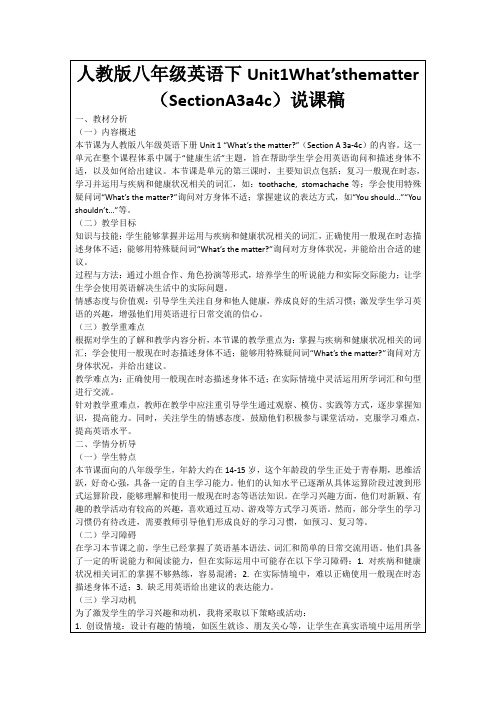
5.联系生活:将教学内容与学生的生活实际相结合,让学生感受到英语学习的实际意义,提高他们的学习兴趣。
三、教学方法与手段
(一)教学策略
我将采用任务型教学法、情境教学法和合作学习法作为主要教学方法。任务型教学法通过设计真实、有意义的任务,让学生在完成任务的过程中习得语言知识,提高语言运用能力。情境教学法则是通过模拟生活情境,让学生在情境中感知、体验和运用语言,增强学习的现实意义。合作学习法则强调学生之间的互动和协作,通过小组讨论、角色扮演等活动,促进学生之间的交流与合作,共同完成学习任务。选择这些方法的理论依据主要是交际语言学习理论、建构主义学习理论和人本主义学习理论,这些理论强调学习者的主动参与、意义建构和情感因素在学习过程中的重要性。
(三)互动方式
为了促进学生的参与和合作,我计划设计以下师生互动和生生互动环节:
1.师生互动:通过提问、回答、示范等方式,引导学生积极参与课堂讨论,及时给予反馈和鼓励,建立良好的师生互动关系。
2.生生互动:组织学生进行小组活动,如角色扮演、小组讨论、共同完成任务等,鼓励学生相互交流、相互学习,提高合作能力。
(三)学习动机
为了激发学生的学习兴趣和动机,我将采取以下策略或活动:
1.创设情境:设计有趣的情境,如医生就诊、朋友关心等,让学生在真实语境中运用所学知识;
2.小组合作:组织学生进行小组讨论、角色扮演等活动,提高他们的参与度和合作意识;
3.激励评价:对学生的表现给予及时、积极的评价,关注每个学生的进步,提高他们的自信心;
1.生活情境:通过展示一位学生在体育课上受伤的视频,引发学生对健康问题的关注,进而引出本节课的主题“What’s the matter?”。
Unit1Whatsthematter知识点讲解带练习课件人教版英语八年级下册
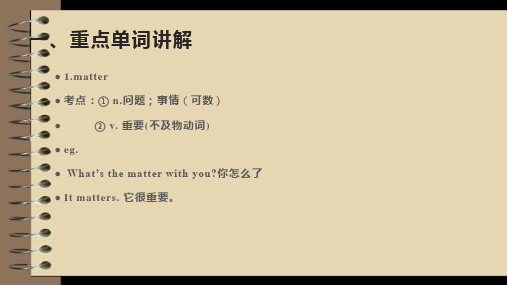
谢谢大家!
● A. get off
B. take off C. turn off D. put off
(二)用单词的适当形式填空
● 1.Look! A dog is _is_l_y_in_g_ (lie) in the middle of the road. ● 2. Mr. Black agreed __to__he_l_p (help) me with my English. ● 3.When I came into the bookstore, I saw him _r_ea_d_i_n_g (read) a book there. ● 4.I’m feeling terrible. I have a h_e_a_d_a_c_he(头痛). ● 5.My mother works in a hospital. She’s a __n_u_rs_e_ in the hospital.(护士)
D. lie down
四、相关练习题
● (一)单项选择
● 3. —________ —My leg hurts. I can't walk.
● A. How are you? B. What's the matter?
● C. What're you doing?
D. What do you look like?
● 5.mean ● 考点:① v.意思是;意味着 ● ② n. meaning意思;意义
● eg, ● What does the new word mean? ● = What’s the meaning of the new word?
●6.decision
●考点:① n. 决定 make a decision做决定
人教版 八年级英语 下册 Unit1_what's_the_matter课件(完整)

Conversation 4 Girl :What’s wrong with your face? Boy: It’s not my face.It’s my tooth.I have a toothache. Girl:You should see a dentist and get an X-ray. Boy:But will it hurt? Girl:No,and if you don’t go to the dentist now,it’ll hurt even more later!
night,I got a stomachache. I almost couldn’t get myself out of bed this morning.
Conversation 3 Nurse:What’s the matter,Ben?Can you move? Ben:Not really.I was playing soccer the other day and I hurt myself.It
foot n. 脚;足 neck n. 颈;脖子
Words and expressions
stomach n. 胃;腹部 throat n. 咽喉;喉咙 fever n. 发烧 lie v.躺;平躺
lie down 躺下 rest v. 放松;休息
cough v. 咳嗽 X-ray n. X射线;X光
Lisa: OK. Thanks, Mandy.
3b Read the passage again and check the things that happened in the story.
Unit1what’sthematter_SectionA知识点梳理人教版八年级英语下册

人教版八年级下册英语课本知识点梳理Unit 1 wh at’s the matter? sectionA课文内容:What's the matter? 怎么了? (教材第1页)【用法详解】What's the matter? 怎么了?/出什么事了?常用于询问某人患了何种疾病,遇到了什么困难等,也可用于询问某物出了什么故障,其后可接with sb./sth.,表示“某人/某物怎么了?”。
其中matter 用作名词,意为“问题;事情”matter前须加定冠词the。
【例句】What's the matter? 怎么了?Bad luck.I lost my pen. 真倒霉,我弄丢了钢笔.What's the matter with him? 他怎么了?He has a sore back.他背痛【拓展】matter[动词] 要紧;有关系多用在否定句、疑问句或条件句中It doesn't matter.没关系。
(通常用来回答对方的道歉)I have a cold. 我感冒了。
(教材第1页)【用法详解】have a cold (患)感冒。
其中have 用作及物动词,意为“患(病);遭受(病痛)”,常用于结构“have a/an +疾病名称”表示患病或身体某部位不舒服。
此时它不能用于进行时态,其第三人称单数形式为has,过去式为had。
常见的表示病痛的短语还有:have a fever 发烧have a toothache 牙疼have a headache头痛have a cough 咳嗽have a stomachache胃痛Do you often have a cold? 你经常感冒吗?Jim had a stomachache after supper yesterday.吉姆昨天晚饭后胃痛。
l have a stomachache.我胃痛。
( 教材第1 页)【用法详解】stomachache [名词]胃痛;腹痛是由“名词stomach(;腹部)+ache(疼痛)”构成的复合名词。
人教版初中八年级下册英语:Unit 1 What's the matter讲解和练习

Unit 1 W hat’s the matter?教学目标1.掌握本课重点短语和句型。
2.掌握情态动词should的用法。
3. 掌握反身代词的用法。
知识梳理一、重点短语have a cold/stomache 感冒/胃痛too much 太多lie down 躺下see an X-ray 拍个X光片fall down 摔倒take one’s temperature 量体温be in control of 掌管;管理cut off 切除take a risk 冒险make a decision/make decisions 做决定thanks to 多亏;由于run out (of) 用尽;耗尽take breaks 休息get off 下车to one’s surprise 使……惊讶的get into 陷入;参与get out of 离开;right away 立即;马上need to do sth 需要做某事see sb doing sth 看见某人正在做某事ask sb sth 询问某人某事expect sb to do sth 期待某人做某事have problems (in) doing sth 做某事有困难be/get used to doing sth 习惯于做某事seem to do sth 好像做某事二、重点句型1.询问健康问题及遇到麻烦时的表达What’s the matter(with sb)?What’s wrong (with sb)?What’s the trouble (with sb)?/What’s one’s trouble?What happened( to sb)?Are you OK?Is there anything wrong (with sb)?2.要表达身体某一部位疼痛或不舒服①sb+have/has+身体部位-ache( headache/toothache…)She had a stomachache last night.②sb+have/has a sore+身体部位He has a sore throat.③sb+hurt(s)+身体部位或反身代词He hurt his leg.④sb+have/has a pain in one’s +身体部位I have a pain in my chest.⑤There is something wrong with one’s+身体部位There is something wrong with my right eye.三、should的用法Should是情态动词,意为“应该;应当”其后接动词原形,无人称和数的变化。
人教版八年级英语下册Unit1 What's the matter全单元课件

3. Do you think it comes from a newspaper or a book?
你认为它是来自报纸还是书呢?
4. I think I sat in the same way for too long without
moving. 我想我以同样的姿势一动不动地坐得太久了。
44. be used to doing sth. 习惯做某事 45. run out (of) 用完;用尽 46. so that 以便 47. so. . . that 如此… …以至于… 48. be in control of 掌管;管理 49. in a d iffic u lt situation 在闲境屮 50. keep on doing sth. 继续或坚持做某事 51. make a decision 做出决定 52. take risks 冒险 53. give up 放弃
2.能运用情态动词should句型给出建议。 3. 正确使用反身代词。
Section A 1a-2d
body
tooth
feet
teeth
nose faceear
toe
neck
face
lห้องสมุดไป่ตู้g
heel
elbow
sing a song
1a Look at the picture. Write the correct letter[a—m] for each part of the body.
__k__arm __c__back _g___ear _i___eye _m___foot __a__hand_l___head b____leg _f___mouth ___d_neck _j___nose __h__stomach _e___tooth
英语人教版八年级下册第一单元What’s-the-matter
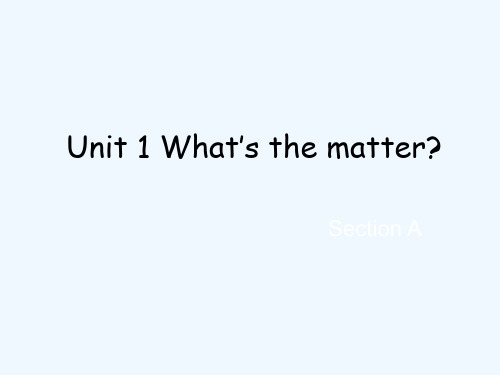
A: What’s the matter? B: I’m not feeling well.
I have a fever. A: When did it start? B: About two days ago. A: Oh, that’s too bad.
Unit 1 What’s the matter?
Section A
body
Name each part of the body
arm
ear
eye foot
leg hand
mouth
nose
tooth
neck
Follow me:
• Everybody moves your body • Nod your head and touch your face • Touch your nose and close your eyes • Touch your ears and clap your hands • Raise your arms and look at your back • Touch your stomach and tap your foot • Sit down and move your legs
What should she do? She should take some medicine.
What’s the matter with you? I have a toothache. You should see a dentist. That’s a good idea.
What’s the matter with her? She has a sore throat. What should she do?
Unit1What'sthematter人教版英语八年级下册教案

(3)时态运用:一般现在时和现在进行时在本章节的对话和描述中占有重要地位,教师需重点讲解并指导学生如何在询问和描述身体状况时正确运用这两种时态。
二、核心素养目标
《Unit 1 What's the matter》的教学旨在培养学生的英语学科核心素养,具体目标如下:
1.提升学生的语言能力,通过学习本章内容,使学生能够熟练运用英语询问和描述身体状况,表达关心与建议,提高实际生活中的交际能力;
2.增强学生的文化意识,了解和尊重不同文化背景下对待疾病和身体状况的态度及表达方式;
举例:
-当学生询问他人身体状况时,能使用"What's the matter?"这一核心句型;
-当描述自己或他人身体不适时,能运用"I have a stomachache."、"You have a fever."等句型;
-在给出建议时,可以使用"You should take some medicine."等短语。
四、教学流程
(一)导入新课(用时5分钟)
同学们,今天我们将要学习的是《Unit 1 What's the matter》这一章节。在开始之前,我想先问大家一个问题:“你们在日常生活中是否遇到过朋友或家人身体不适的情况?”比如,朋友突然说肚子疼,你会怎么关心和帮助他们呢?这个问题与我们将要学习的内容密切相关。通过这个问题,我希望能够引起大家的兴趣和好奇心,让我们一同探索如何用英语询问和描述身体状况。
人教版英语八年级下册Unit1What'sthematter?含答案

Unit 1 What's the matter?班级:________ 姓名:________ 得分:________(测试时间:90分钟总分:120分)听力部分(共20分)一、听句子或对话,根据所听内容选择最佳应答句。
句子或对话念两遍。
(共5小题,每小题1分,满分5分)( )1.A.I have a pen.B.I have a toothache.C.It’s great.【答案】B【听力】What’s the matter, Frank?( )2.A.Yes, she is.B.I’m happy to hear that.C.She should go to see a doctor.【答案】C【听力】Lucy has a bad fever.( )3.A.Three days ago.B.Three days later.C.For three days.【答案】A【听力】When did your sore throat begin?( )4.A.I eat healthy food.B.I’m at school.C.I’m much better. Thank you.【答案】C【听力】How are you feeling now, Tom?( )5.A.I hope so.B.Good idea.C.You’re welcome.【答案】B【听力】You should lie down and rest for a few days.二、听对话,根据对话内容选择最佳答案。
对话念两遍。
(共5小题,每小题1分,满分5分)( )6.What’s the matter with the woman?A.She is stressed out.B.She can’t sleep well.C.She has a cold.【答案】C【听力】M:Why are you taking the medicine?W:Because I have a bad cold.( )7.Which part did Cindy hurt?A.Her leg.B.Her arm.C.Her foot.【答案】A【听力】M:Where is Cindy? Did you see her?W:No, she fell down the stairs and hurt her leg. She is in hospital now. I want to cheer her up. Would you like to go with me?( )8.What did Jim do last weekend?A.He went to the movies.B.He played tennis.C.He danced with friends.【答案】B【听力】W:I went to the movies last weekend. How about you, Jim?M:I played tennis with my friends.( )9.What did the boy do last night?A.He played computer games.B.He watched the basketball game on TV.C.He did his homework.【答案】B【听力】W:Did you do your homework last night?M:No, I didn’t. I watched a basketball game on TV. It’s very interesting.( ) 10.Who is the woman?A.The boy’s grandma.B.The boy’s mother.C.The boy’s aunt.【答案】C【听力】W:Is this your mother?M:No, this is my aunt Gina.三、听短文,根据所听内容选择最佳答案。
八年级下册unit_what‘s_the_matter课文重难点讲解

Unit1 What’s the matter?1. What’ s the matter? 怎么啦?出什么事情了?【解析】用于询问某人有什么病或某人遇到什么麻烦、问题其后跟询问对象时,与介词with连用。
即:What’s the matter with sb.? = What’ s wrong with sb ?= What’s one’s trouble ? = What’s the trouble with sb ? = What’s up?= What happens to sb.?Eg:— What’s the matter with you ? — I have a bad cold.【注】:matter 和trouble 为名词,其前可加the 或形容词性物主代词,wrong 是adj. 不能加the 1) —What’s the matter ______ Tom. He is wet through. —His car ran _______ the river.A with; in B.to; into C.with; into2) What’s ____ with you? A.trouble B.the matter C. the wrong D. matter3)— ______? — Nothing serious , but a bit tired.—Better have a rest now, dear. A. What’s the matter with youB. Is there anything elseC. What’s thisD.Is that all4)—_________? — I have a headache and I don’t feel like eating anything.A. How are youB. What can I do for youC. What’s the matter with youD. How do you like it5). —What’s the matter with Tina ? —_________.A. She is away.B. She is cool.C. She has a sore throat.D. She should take some medicine【拓展】matter的用法 (1) It doesn’t matter 没关系(用来回答别人道歉时的用语)6) — I’m sorry to break your pen. —_______A. That’s rightB. It doesn’t matterC. Thank you7).Please don't throw paper on the ground. —____,I won't.A. Excuse meB. That's all rightC. SorryD. It doesn't matter8).-I have a pain in my back. - _____ . You’d better see a doctor.A. I’m sorry to hear thatB. Nothing seriousC. It doesn’t matter9)—I’m very sorry. I broke your tea cup. —__________.A. It doesn’t matterB. You’d better notC. Take it easyD. It’s too bad10).—Sorry, I'm late again. —______.A.That’s OK B.It doesn't matter C.Good idea2.【解析1】have a/an + 疾病名词“患……病” (cold/fever/cough。
人教版八年级英语下册 Unit1 What's the matter单词讲解
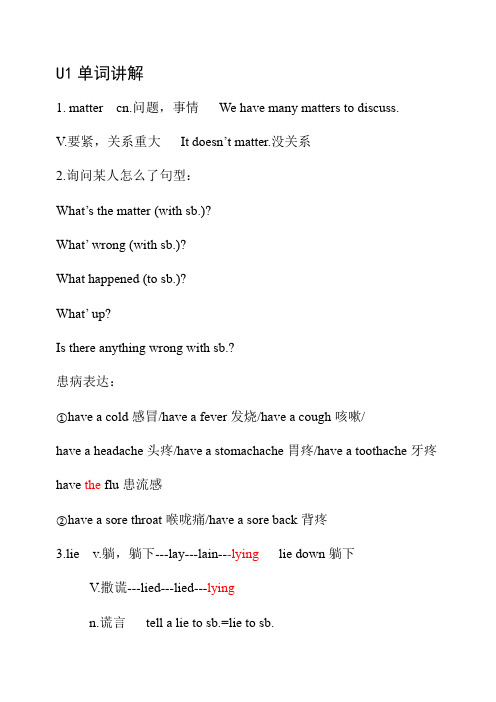
U1单词讲解1.matter cn.问题,事情We have many matters to discuss.V.要紧,关系重大It doesn’t matter.没关系2.询问某人怎么了句型:What’s the matter (with sb.)?What’ wrong (with sb.)?What happened (to sb.)?What’ up?Is there anything wrong with sb.?患病表达:①have a cold感冒/have a fever发烧/have a cough咳嗽/have a headache头疼/have a stomachache胃疼/have a toothache牙疼have the flu患流感②have a sore throat喉咙痛/have a sore back背疼3.lie v.躺,躺下---lay---lain---lying lie down躺下V.撒谎---lied---lied---lyingn.谎言tell a lie to sb.=lie to sb.4.rest n.休息&v.休息rest=have a restadj.剩余的the rest of...5.break n.休息take a break=take breaksv.①打破break the window ②违背break the law/rulebreak up打碎break down出故障break out爆发break into闯入6.get off下车---get on上车(空间大:bus)get in上车----get out of下车(空间小:car)7.trouble n.问题,苦恼have trouble/difficulty/problems(in) doing sth.eg:I have trouble in learning English.get into trouble陷入麻烦get out of trouble摆脱麻烦V.麻烦trouble sb. to do sth.麻烦某人做某事8.right away立即,马上=at once=right now=immediately9.sick adj.生病的,有病的be sick=be ill 但是ill只能做表语adj.恶心的,厌倦的feel sick感到恶心10.b reathe v.呼吸---breath n.呼吸take a deep breath深呼吸11.b e used to doing习惯于做某事used to do过去常常做某事be used to do被用来做某事eg:I used to drive to work,but now I am used to taking a bus.12.r isk v.冒险risk doing冒险做某事n.风险,危险take a risk=take risks13.accident n.事故----accidental adj.意外的---accidently adv.意外地14.sb. run out of sth.用完,用尽sth. run out15.cut---cut---cut---cuttingcut off切除cut up切碎cut down砍倒,减少cut out删除,剪下cut in插嘴16.m ean---meant---meantmean to do打算做某事mean doing意味着做某事meaning n.意思What’s the meaning of...?=What does ... mean?=What do you mean by...?meaningful adj.有意义的---meaningfully adv.meaningless adj.无意义的---meaninglessly adv.17.i mportant n.重要性---important adj.重要的the importance of... ...的重要性18.d ecision n.决定---decide v.决定decide to do=make a decision to do19.c ontrol控制,管理---controlled---controlledbe in control在控制下be out of control失去控制20.d eath n.死,死亡---die v.死---dead adj.死了的---dying adj.垂死的eg:The dog’s death makes me sad.The dog died 3 days ago.The dog was dead when I found it.21.g ive up放弃give up doing give it/them upgive away捐赠give out分发give off发出(光、热等)give in屈服。
新人教版初二下册英语知识点归纳-Unit-1-What’s-the-matter

新人教版初二下册英语知识点归纳:Unit-1-What’s-the-matter一.询问某人患了何种疾病或遇到什么费事时,常用以下句型:1.What’s the matter 〔with sb〕?2. What’s the trouble / problem〔with sb〕?3.What’s wrong 〔with sb〕? 你怎么了?4. What’s one’s trouble / problem ?5.What’s up ?6. What happened to sb ?7.Are you OK ? 8. Is there anything wrong with sb ?二.表达身体不适或疼痛时,常用以下构造:1.Sb + have /has + a / an + 疾病名称:have acold(患感冒)/ fever / cough / temperature注:have a cold相当于get a cold/catch a cold/have got a cold;have a bad cold(患重感冒);have a heart problem 有心脏病2.Sb + have/ has a sore +身体部位:have a sore throat / back3.Sb + have / has+ a+ 身体部位+ache(构成疾病名词)have a toothache /headache / stomachache / earache /backache4.Sb + hurt(s) +身体部位/ oneself ; He hurt his leg .或身体部位+ hurts ; My head hurts badly .5.There is someth ing wrong with one’s +身体部位。
6.Sb +have /has a pain in one’s +身体部位三.情态动词should / should’t 的用法:意为’应该,应当’ 后接动词原形,无人称和数的变化。
- 1、下载文档前请自行甄别文档内容的完整性,平台不提供额外的编辑、内容补充、找答案等附加服务。
- 2、"仅部分预览"的文档,不可在线预览部分如存在完整性等问题,可反馈申请退款(可完整预览的文档不适用该条件!)。
- 3、如文档侵犯您的权益,请联系客服反馈,我们会尽快为您处理(人工客服工作时间:9:00-18:30)。
Unti1 what’s the matter?短语归纳1.too much 太多2.lie down 躺下3.get an X-ray 做个X光检查4.take one ’s temperature 量体温5.put some medicine on ......在....上敷药6.have a fever 发烧7.take breaks /take a break 休息8.without thinking twice 没多想9.get off 下车10.take sb to the hospital 送某人去医院11.wait for等待12.to one’s surprise 使.......惊讶的13.thanks to多亏于;由于14.in time及时15.think about 考虑16.have a heart problem患有心脏病17.get into the trouble 遇到麻烦18.do the right thing做正确的事情事情19.fall down 摔倒20.put ...... on sth把...放在某物上21.get hit/sunburned 摔伤/烧伤22.be interested in 对.....感兴趣23.be used to 习惯于.... 24.take risks/take a risk 挑战25.lose one’s life 失去生命26.because of 因为27.run out of 用完28.cut off 切除29.get out of 从...出来30.make a decision/decisions 做决定31.be in control of 掌管;管理32.give up 放弃用法归纳1.need to do sth .需要去做某事2.see sb doing sth 看见某人正在做某事3.ask sb sth 询问某人某事4.expect sb to do sth 期望某人做某事5.agree to do sth 同意做某事6.help sb (to) do sth 帮助某人做某事7.want to do sth 想要做某事8.tell sb to do sth 告诉某人做某事9.have problems(in) doing sth 做某事有困难e sth to do sth用某物去做某事11.be/get used to doing sth 习惯于做某事12.seem to do sth 好像做某事13.keep on doing sth 继续做某事14.mind doing sth 介意做某事语法点1.询问某人的健康问题及遇到麻烦的表达方法2.情态动词should的用法3.不定代词的用法精细解读1. What’s the matter (with you)? 怎么了?出什么事了?What’s the trouble/ the problem / wrong with sb./ sth.?2. I had a cold.我感冒了。
have a cold=catch a cold=have the flu感冒have a fever发烧have a cough咳嗽have a stomachache胃疼,肚子疼have a toothache牙疼have a headache头疼3. 身体部位+ache(疼痛)构成新的复合词stomach+ache=stomachache head+ache=headache tooth+ache=toothacheback+ache=backache后背痛4. much too+形容词或副词,意为太。
,too much+不可数名词,意为太多。
5. enough【形容、副词】足够的/地,enough放在名词后,形副后。
good enough足够好,enough money足够的钱6. lie down躺下,lie 躺,躺着,过去式lay;lie说谎,过去式lied7. maybe “或许”,常用于句首,表示可能性,后加句子。
Maybe you are right.may be,是情态动词+be的结构,意为“可能,也许”,后加名词、代词或形容词。
He may be angry.8. sound like+名词代词和从句:It sounds like you don’t know the truth.It sounds like a good idea.sound+形容词,“听起来,好像”,The music sounds nice.9. need 需要,实义动词need+名词,需要某物;need to do sth.需要做某事,主语通常是人,表示人主动的动作:You need to listen carefully during class.need doing sth.主语通常是物,表示被动的动作:Your dirty clothes need washing.10. get off (the bus) 下(公交车)get on 上车11. agree 同意,赞同;同意做某事agree to do ,同意某人的看法、观点agree with sb。
12. trouble问题,麻烦;be in trouble 陷入困境,make trouble 制造麻烦,have trouble (in) doing sth. =have difficulties (in) doing sth 做某事有困难。
13. right away=right now=at once,意为立刻,马上。
14. run out用完,用尽When his water run out, he knew that he would have to do something to save his own life.物sth. run out. 某物用尽了。
人sb. run out of sth..人用尽了某物。
He run out of all his money last night.15. risk (sb.) to do sth. 冒险去做某事take a risk=take risks 冒险16. the importance of (doing) sth.(做)某事的重要性We students should know the importance of (learning) English.importance n. 重要(性),important adj.重要的,unimportant adj.不重要的17. decision 【名词】决定;抉择;make a decision 做决定18. be in the control of …掌管,管理The headmaster is in the control of this new school.be out of control无法控制,无法管理重点语法【反身代词】英语中共有八个反身代词,在使用时应注意和它所指的相应的对象在人称、性用在某些固定短语当中。
如:look after oneself / take care of oneself 照顾自己teach oneself sth./ learn sth. by oneself自学enjoy oneself 玩得高兴,过得愉快help oneself to sth 请自用……(随便吃/喝些……).hurt oneself摔伤自己say to oneself自言自语leave sb. by oneself把某人单独留下buy oneself sth.给自己买……东西introduce oneself 介绍……自己【提醒】1. 反身代词不能单独做主语,但可以做主语的同位语,起强调作用。
如:我自己能完成作业。
(误)Myself can finish my homework. (正) I myself can finish my homework. / I can finish my homework myself.2. 反身代词表示“某人自己”不能表示“某人的东西”,因为它没有所有格的形式。
表达“某人自己的(东西)”时,须要用one’s own.如:我用我自己的蜡笔画画。
(误)I’m drawing with myself crayons. (正) I’m drawing with my own crayons.【练习】1. My classmate, Li Ming, made a card for _________ just now.2. Bad luck! I cut _________ with a knife yesterday.3. They tell us they can look after_________ very well.4. My cat can find food by_________ .5. Help __________to some beef, boys.6. Jenny enjoyed_________ in the park yesterday afternoon.7. We can finish our homework by_________ .8. The blind girl lost_________ in the beautiful music.9. Xiao Hui, can you introduce _________ to us ?10. Bill wants to teach_________ French from now on.。
